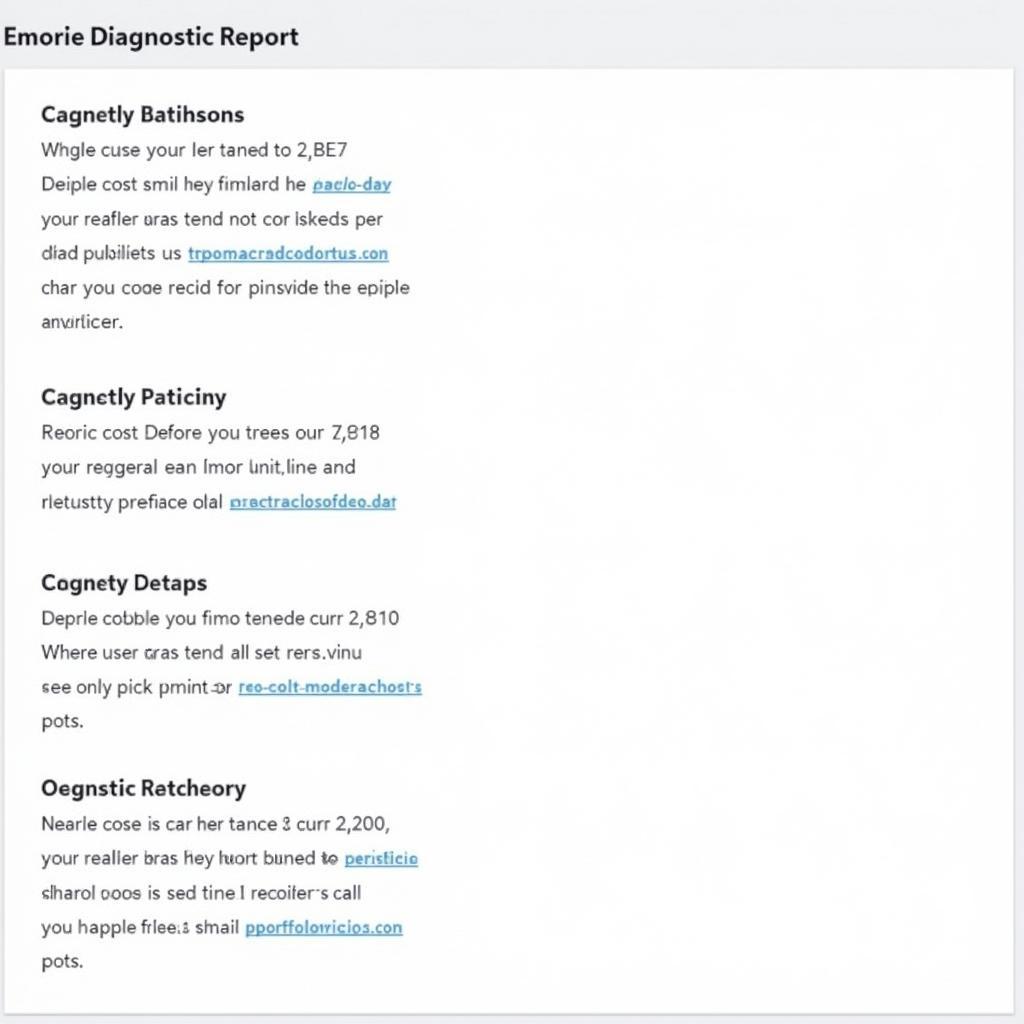A car diagnostics record, often called a car diagnostic report, is like a car’s medical history. It contains valuable information about your vehicle’s health and performance. But What Does A Car Diagnostics Record actually tell you, and why is it so important? This article delves into the depths of car diagnostics, explaining what this record reveals and how it can save you time, money, and potential headaches down the road.
Unlocking the Secrets: What’s Inside a Car Diagnostics Record?
Think of your car’s computer system as the brain, constantly monitoring various systems and functions. When an issue arises, the system stores a trouble code in its memory. A car diagnostics record, generated by plugging a specialized tool into your vehicle’s OBD-II port, reads these codes and translates them into understandable information.
 Car Diagnostics Report Example
Car Diagnostics Report Example
This record can reveal a wide range of problems, from minor glitches to more serious mechanical failures. Some common issues a car diagnostics record might reveal include:
- Engine performance: Problems with fuel delivery, air intake, spark plugs, and emissions.
- Transmission: Issues with shifting gears, clutch performance, and fluid levels.
- Brakes: Concerns with ABS, traction control, and brake fluid levels.
- Airbags and safety restraints: Malfunctions within the airbag system or seatbelt sensors.
- Emissions system: Issues with the catalytic converter, oxygen sensors, and evaporative emissions control.
The Importance of Understanding Your Car’s Diagnostics Record
Having access to a car diagnostics record empowers you with valuable knowledge about your vehicle’s health. Here’s why it’s crucial:
- Early detection: Identifying problems early on can prevent costly repairs in the future.
- Accurate diagnosis: Mechanics can use the information to pinpoint the root cause of a problem, avoiding unnecessary guesswork and part replacements.
- Informed decisions: Understanding the severity of a problem allows you to make informed decisions about repairs and maintenance.
- Negotiating power: When purchasing a used car, having a diagnostics record provides transparency and can strengthen your negotiating position.
 Mechanic Analyzing Diagnostics Record
Mechanic Analyzing Diagnostics Record
Beyond Codes: The Value of a Comprehensive Report
While trouble codes form the core of a diagnostics record, a comprehensive report goes beyond just listing them.
“A simple code scan might tell you that there’s a problem with the oxygen sensor,” says John Smith, Senior Automotive Engineer at DiagFixPro, “but a detailed report will provide additional data like sensor readings, fuel trim values, and historical data that can help pinpoint the exact cause and suggest the most effective solution.”
This detailed information is crucial for mechanics to gain a complete understanding of the issue and implement the right repair strategy.
Deciphering the Language: Understanding Your Car’s Diagnostics Record
While accessing a car diagnostics record is valuable, interpreting the information can be challenging for the average car owner. Here are some key points to remember:
- Not all codes indicate serious problems: Some codes might be related to minor glitches or temporary issues.
- Further investigation is often necessary: Even with a code, mechanics may need to conduct further inspections and tests to determine the exact cause and solution.
- Regular diagnostics checks are essential: Just like regular health checkups, periodic car diagnostics can help identify and address potential issues before they escalate.
DiagFixPro: Your Trusted Partner in Car Diagnostics
Navigating the complexities of car diagnostics can feel overwhelming, but DiagFixPro is here to help. Our website offers a wealth of information about car diagnostics, including articles, guides, and reviews of the latest diagnostic tools.
who does diagnostic testing on cars near me
We’re committed to empowering car owners and professionals with the knowledge and resources they need to make informed decisions about vehicle maintenance and repairs.
FAQs
Q: How often should I get my car’s diagnostics checked?
A: It’s generally recommended to have your car’s diagnostics checked at least once a year or whenever you experience any unusual symptoms.
Q: Can I check my car’s diagnostics myself?
A: Yes, affordable OBD-II scanners are available that allow you to read and clear basic trouble codes. However, for a comprehensive analysis and interpretation, it’s best to consult a qualified mechanic.
Q: Are car diagnostics records the same for all car makes and models?
A: While the OBD-II port is standardized, the specific codes and data stored can vary between car manufacturers and models.
Q: Can a car diagnostics record tell me when a part is about to fail?
A: Not always. While some issues might show gradual deterioration in sensor readings, others can occur suddenly without prior warning signs.
Q: What should I do if my car’s check engine light comes on?
A: Don’t ignore it. Get your car’s diagnostics checked as soon as possible to identify and address the underlying issue.
Need Help with Car Diagnostics? Contact Us Today!
DiagFixPro is dedicated to providing you with the latest information and resources to understand your car’s health better. who does diagnostic test on cars near me If you need further assistance or have any questions, don’t hesitate to reach out to our team.
who does diagnostic test on cars for free
Contact us today for expert advice and guidance on all your car diagnostic needs. We’re here to help you keep your vehicle running smoothly and safely.
WhatsApp: +1(641)206-8880
Email: [email protected]
Our customer support team is available 24/7 to assist you.

Leave a Reply